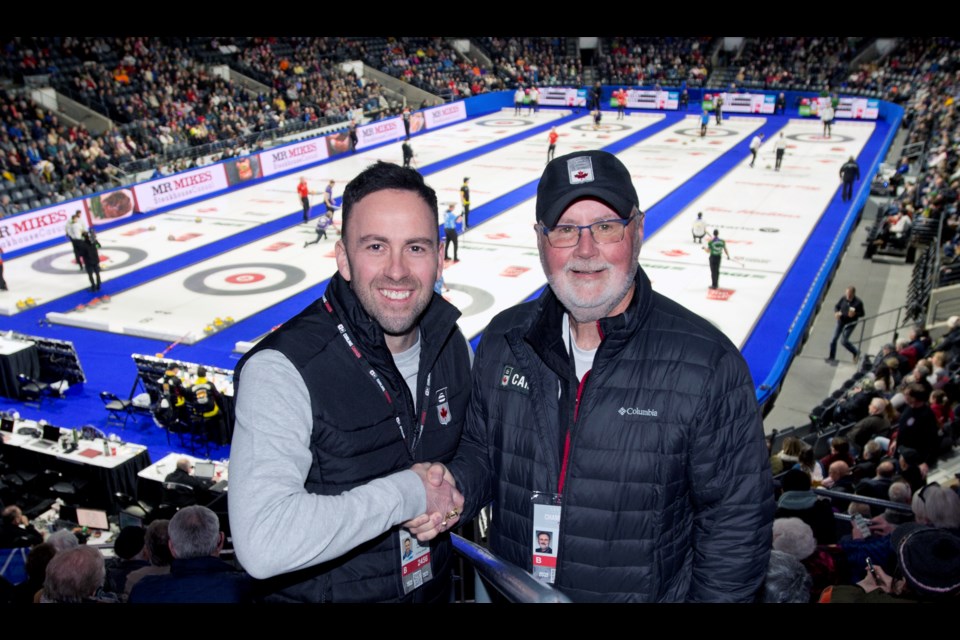When Gerry Peckham left his Prince George hometown to move to Ottawa and become Curling Canada’s high-performance director in 1990, international curling was on the cusp of becoming an Olympic sport.
After successive Olympics in Calgary and Albertville as a demonstration sport, curling got its medal status in 1998 in Nagano, Japan, a defining moment in a sport Canadians clearly identify as one of their own.
Peckham was there in Nagano to see curling exposed to worldwide audiences like never before. Seeing Sandra Schmirler and her team from Saskatchewan stand for the anthem and flag-raising atop the Olympic podium that year stands as the pinnacle of his 33-year career with Curling Canada.
“Our first Olympic experience was incredibly memorable because it had such a profound impact on the sport,” said Peckham. “It was a gamechanger because it impacted how we went about the business of high performance and how hard athletes began to train on and off the ice to improve their performance and it had a ripple effect.”
Canada no longer dominates curling internationally and Peckham says recent results in world competition are not due to Canadians playing poorly. It’s just that the rest of the world has caught up.
“It’s irrefutable, the quality of play has moved substantially and I think it’s a byproduct of really good coaching, well-run programs, dedicated focused athletes and lots of opportunity that allows you to compete at a level that allows you to become world class,” said Peckham, who says Curling Canada has willingly contributed to making other countries stronger by sending coaches and program development program expertise to places like Japan, South Korea, China and the United States.
“In all honesty, it’s great for the game that so many countries put teams on podiums, whether its juniors or women’s or mixed doubles. When you look back at the end of a season or a quadrennial at how many flags have been raised for some podium finish it’s truly impressive. It’s truly international and there’s no second-guessing that.”
He attended the Olympics in Albertville, Salt Lake City, Torino and Vancouver, and Canadian curlers did their part in Peckham’s return to his home province in 2010. Kevin Martin won gold in the men's event, the Cheryl Bernard rink won silver, and Jim Armstrong of Richmond went on to capture Paralympic gold.
“It was such a phenomenal overall experience, you felt so proud to be Canadian and British Columbian, just because of that Vancouver dynamic, it was unimaginable,” said Peckham.
Canada won the first three Paralympic competitions (Torino, Vancouver and Sochi) with Joe Rea of Prince George as the national team head coach.
Peckham is the son of Prince George curling legend Wilf Peckham and he owes his involvement in the sport to him.
He played every sport he could as a kid and it became obvious late in his teen years he had teaching ability and began to apply those qualities as a curling/racquet sport coach. In 1974, he started writing instructional coaching and training manuals on contract for Curling Canada, with his dad as his chief scrutineer, editor and proof-reader. By the time he assumed his duties as high-performance director at age 40 in 1990, Gerry’s grassroots background had him well prepared.
Once this season is over, Peckham will hand off his high-performance duties to 44-year-old David Murdoch of Scotland, a two-time world champion. Peckham, 72, plans to remain in Ottawa with his wife, Joan Merrin, working as a consultant to help ease Murdoch into the position.
“I think he’s unquestionably the subject matter expert these days in high performance and producing elite teams and the fact we enticed him to come and take over is the best possible solution,” said Peckham. “He’s really well-liked so he’ll fit into the curling culture here very easily."



